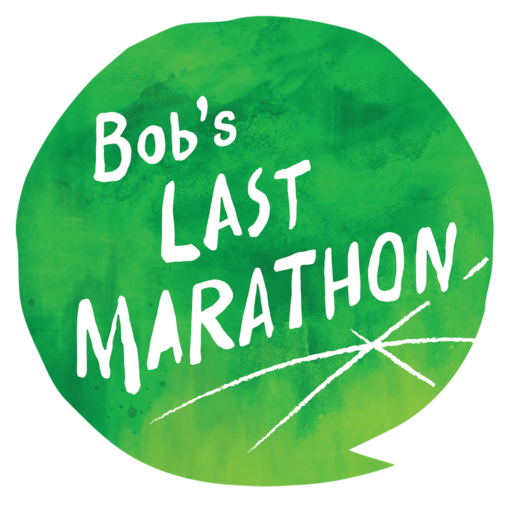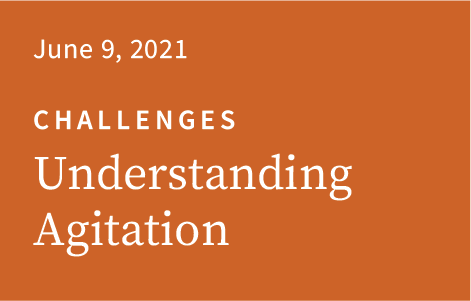Transcript
Understanding Agitation
When I’m asked about our dementia journey, people’s well-meaning first question seems to be, “Did he forget you?” or “Did he ever get aggressive, or hit you?” These are not simple questions, and they certainly do not have simple answers, but they are on everyone’s mind.
My answer to the first question is that the heart never forgets, so while my name might have escaped him at times, his heart never forgot me and we were always connected.
My answer to the second question is a little more complicated.
One March afternoon, about three years after Steve’s diagnosis, my father-in-law, Cliff, paid us an unexpected visit. We could tell he was upset. Standing at the front door, he said he didn’t know what to do, that he couldn’t get his wife to calm down. We saw Claire sitting alone in the car, staring straight ahead as if we weren’t there. Claire was diagnosed with Alzheimer’s four years prior to Steve’s diagnosis.
I ushered Cliff into the kitchen while Steve walked with Claire through the house, looking at photos, holding hands, laughing. She was telling a detailed story about just returning from her mother-in-law Ruth’s house and baking cookies. It was all very pleasant, except for the fact that Ruth had been dead for years.
When they joined us in the kitchen, Claire gave me a look I had never seen on her face before. She leaned in close and accused me of stealing her husband, yelling, “Who do you think you are to go after a married man?” Steve and I were stunned. Looking embarrassed, Cliff gave his wife a kiss on the cheek and calmed her down by reassuring her of his commitment to her.
After they left, Steve and I hugged and cried, shocked by the sudden transformation of this consummate mother and grandmother into a hostile person. I couldn’t help wondering what lay ahead for Steve. As though reading my mind, Steve looked at me and said, “That will never happen to me.” He assured me he could never be combative because it just wasn’t his nature. What he didn’t say, but was well known to both of us, was that it wasn’t Claire’s gentle nature either.
About a year later, we were shaken to the core seeing Claire screaming and pounding the windows of a geriatric psych unit. My heart broke for her, and for my darling husband, who had to witness his mother in this unrecognizable state while fearing it was a preview of his own future.
Over the next few years we saw only a few incidents of agitation or confusion. Little things, like snapping at the waiter apologizing for a delay in our food. Or accusing our son of wanting our car and plotting to steal our tools—this from the same man who gave his son that car, and felt privileged to have a son who often sought his counsel.
Many times over the years, Steve would ask medical professionals whether he was destined to follow in his mother’s footsteps. The answers ranged from “We never know from person to person what will happen” to “Sometimes it never happens”—words that gave us solace.
But over time, Alzheimer’s inevitably took possession of Steve’s brain. Sometimes it would reveal itself as uncontrollable sadness, other times as delusional obsessions—wishing that he had one decent pair of pants, for example, even though he already had many. Possibly more painful were lucid moments when Steve realized all that he was losing.
Carly and Luke, our amazing children, and I did our best to cope. We’d validate his feelings and redirect his agitated thoughts. Sometimes we were able to bond over unimaginable scenarios, like when all 6 feet 2 of Steve came nose to nose with Luke and said, “Don’t worry, I’m not going to hit you, but I sure as hell would like to.” Through our tears, in this surreal moment, we caught each other’s eye, and we found a moment of humor. At other times, the grandchildren were the best remedy we had.
A turning point came one beautiful summer afternoon. Sitting outside, Carly and I could see Steve’s mood changing and guided him into the house. Walking across the kitchen supported by his two most beloved women, Steve stopped dead in his tracks, clenched his fist, turned to me and then struck out at me. Carly and I instinctively responded in disbelief, “You can NOT do that! That is NOT okay!” We got him to the sofa and looked at him, our sweet gentle husband and father, and realized it wasn’t STEVE who struck out, it was the severe symptoms of his disease.
We knew this was just the beginning, and we needed to be better prepared, both emotionally and physically. One doctor helped by relating these incidents to a seizure. When a person has a seizure, they are not acting like their usual selves; their actions are disease symptoms. This really helped us feel empathy and patience, as opposed to aggravation.
A care coordinator from the Alzheimer’s Association reminded me that while I was doing a great job keeping Steve safe, I needed to remember that my safety was paramount. If ever I needed to step away to protect myself, she said, then indeed I should.
With each week, Steve’s symptoms became worse, and more frequent. My dearest darling would sit looking tortured, rambling on to an empty corner of the room. I recorded some of his monologues and listened to them over and over to find traces of reality. I hoped to find a real, fixable source of his agitation, so that maybe I could alleviate it.
During this time, I was in constant contact with his neurologist, Dr. Teresa Gomez-Isla. She was very careful with anti-psych medications and dosage. She reminded me that, sadly, there was no pharmacological solution for agitation.
It also was becoming clear that our once reliable methods for redirecting Steve were getting less and less effective. Sitting by the pool no longer brought him peace. But the ultimate sign that things had drastically changed came when the grandchildren could no longer snap him out of his agitated spells. Adjustments in medications helped for about four days, and then it would seem like the symptoms out-battled the higher dosage and came back with a vengeance.
Each evening around 5, I could see the veil of confusion descending. Steve would start pacing and wringing his hands. “Come on,” he’d say urgently. “Let’s go, they have guns and they’re coming to take the kids.” Even in his state of delusion, I could see the real Steve coming through in his need to protect his children.
But there were times when he saw me as someone else, and I had to protect myself against his defensive behavior. I placed a white wastebasket in each room, a safety measure to keep him at arm’s length if need be. This allowed me to stay close enough to offer support, but also stay safe. And, there were times I did need to step outside and watch him through the doorway, or call my kids or a friend to help us find our way back to our baseline.
On October 21, 2017, Alzheimer’s made it clear that we were no longer in control of our lives. Steve was pacing and tipping furniture over. At Dr. Teresa’s urging, we took him to the ER, hoping for admission to the geriatric psych unit, where we could decide our next step.
After we had waited for hours there, Steve’s hallucinations set in. The aides seemed more focused on restraining him—with force—than helping him feel more comfortable. How could it be that medical professionals didn’t know how to navigate these late-stage symptoms of Alzheimer’s?
After he had spent four days in the ER, four weeks in a geriatric psych unit, and four and a half months in a skilled nursing facility, I asked my darling if he was tired of all this. He didn’t even open his eyes, but a tear rolled down his cheek as he nodded. I was grateful that we felt the same way—more proof that the heart never forgets.
I reminded Steve that I would be okay, and even after a thousand years together we still wouldn’t have known how to say goodbye to each other, that nature had a different plan, and that it would be wise for us to respect it.
Seven days later Steve broke free from the chains of Alzheimer’s, and his gentle soul found peace.
Judith Johanson
MADRC Longitudinal Cohort Coordinator
Massachusetts General Hospital
Board Member
Massachusetts/New Hampshire chapter
Alzheimer’s Association
www.madrc.org

